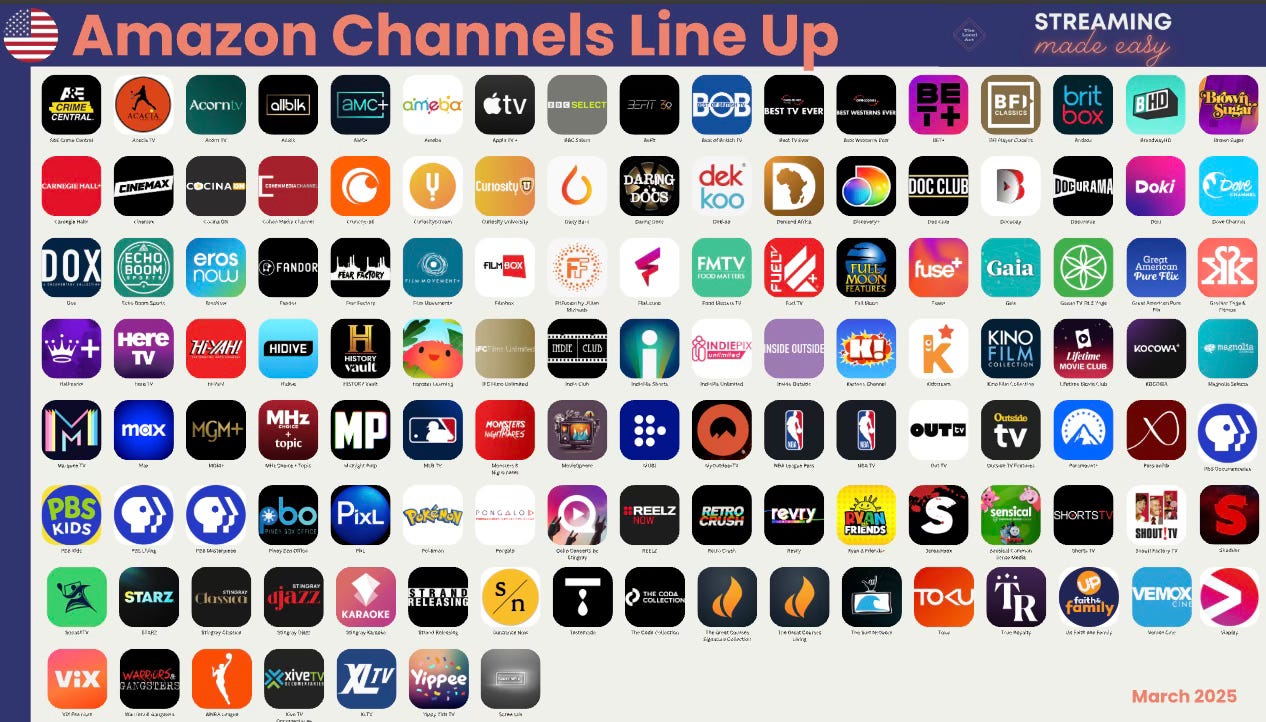📦 Amazon Channels, Unpacked
Across 6 Markets
In streaming, I see a world divided in 2. General entertainment streamers & Specialty/niche streamers. It’s a bit simplistic I know but bear with me for the sake of today’s discussion.
The main difference between the two categories? The former goes wide (in the genres it caters to, the audiences it ambitions to reach) when the latter goes deep (it’s here to super serve a specific audience with a given array of genres and programs).
Both need to achieve ubiquitous distribution but how they go about it differs.
As a D2C streamer, you build your app to go live in the relevant app distribution hubs in your markets. The biggest challenge for Specialty streamers is not access to these hubs (although it is time and resource intensive to launch your app on so many platforms and Pay TV cherrypicks) but discoverability. Only a subset of apps are featured above the fold, have the budget to pay for on platform promotion or a button on a remote.
In an app-first environment, the focus is therefore on the biggest streaming brands leaving Specialty streamers better suited to thrive in a content first environment. The most notable example being Amazon Prime Video Channels where viewers pay for Amazon Prime then can add additional channels in an a-la-carte model, like $8.99 for BritBox or $7.99 for Crunchyroll.
Now what used to be the preferred playground of Specialty Streamers appeals to Mainstream players like Max, Paramount+ or Apple TV+ too. Why? Even for them it’s getting harder to thrive in an app-first world. To gain new subscribers, they are prepared to surrender some control to a platform like Amazon Channels.
In this edition, I want to focus on the Amazon Channels content value proposition (in the US and EU5 markets) as I feel it is the most advanced platform in the space (but stay tuned for more platform coverage).
Today at a glance:
The Breadth Of Their Offering
The Genre Composition
The Cross-Market Channel Presence
The Pricing Strategies
Plus you’ll get tons of visuals with granular data per market
📰 Want to share your experience as an Amazon Channel and get it featured in Streaming Made Easy Premium? Let’s talk.
👩🏻🏫 Fancy organising for your team an hour-long masterclass on Amazon Channels with even more data (streamer focus, genre or country deep dives)? Let’s schedule time to discuss your team’s needs.
📊 The Breadth Of Their Offering
Amazon Channels was launched in the US in 2015, in the UK and Germany in 2017, France in 2019 and Italy and Spain in 2020.
Here’s what their channel count (across the 6 markets) looks like in March 2025:


